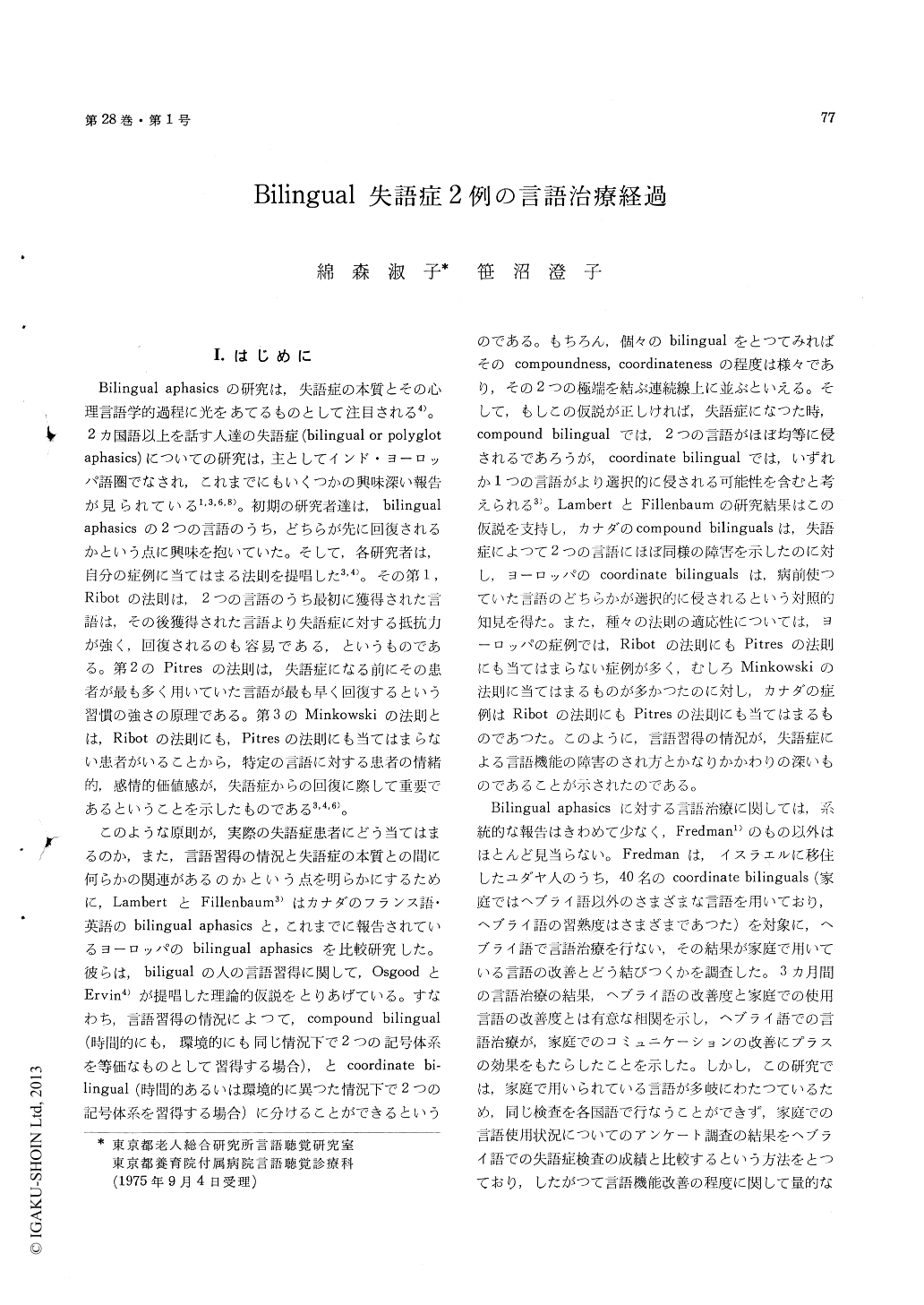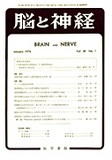Japanese
English
- 有料閲覧
- Abstract 文献概要
- 1ページ目 Look Inside
I.はじめに
Bilingual aphasicsの研究は,失語症の本質とその心理言語学的過程に光をあてるものとして注目される4)。2カ国語以上を話す人達の失語症(bilingual or polyglotaphasics)についての研究は,主としてインド・ヨーロッパ語圏でなされ,これまでにもいくつかの興味深い報告が見られている1,3,6,8)。初期の研究者達は,bilingualaphasicsの2つの言語のうち,どちらが先に回復されるかという点に興味を抱いていた。そして,各研究者は,自分の症例に当てはまる法則を提唱した3,4)。その第1,Ribotの法則は,2つの言語のうち最初に獲得された言語は,その後獲得された言語より失語症に対する抵抗力が強く,回復されるのも容易である,というものである。第2のPitresの法則は,失語症になる前にその患者が最も多く用いていた言語が最も早く回復するという習慣の強さの原理である。第3のMinkowskiの法則とは,Ribotの法則にも,Pitresの法則にも当てはまらない患者がいることから,特定の言語に対する患者の情緒的,感情的価値感が,失語症からの回復に際して重要であるということを示したものである3,4,6)。
このような原則が,実際の失語症患者にどう当てはまるのか,また,言語習得の情況と失語症の本質との間に何らかの関連があるのかという点を明らかにするために,LambertとFillenbaum3)はカナダのフランス語・英語のbillngual aphasicsと,これまでに報告されているヨーロッパのbilingual aphasicsを比較研究した。彼らは,biligualの人の言語習得に関して,OsgoodとErvin4)が提唱した理論的仮説をとりあげている。すなわち,言語習得の情況によつて,compound bilingual(時間的にも,環境的にも同じ情況下で2つの記号体系を等価なものとして習得する場合),とcoordinate bi—lingual (時間的あるいは環境的に異つた情況下で2つの記号体系を習得する場合)に分けることができるというのである。もちろん,個々のbilingualをとつてみればそのcompoundness,coordinatenessの程度は様々であり,その2つの極端を結ぶ連続線上に並ぶといえる。そして,もしこの仮説が正しければ,失語症になつた時,compound bilingualでは,2つの言語がほぼ均等に侵されるであろうが,coordinate bilingualでは,いずれか1つの言語がより選択的に侵される可能性を含むと考えられる3)。LambertとFillenbaumの研究結果はこの仮説を支持し,カナダのcompound bilingualsは,失語症によつて2つの言語にほぼ同様の障害を示したのに対し,ヨーロッパのcoordinate bilingualsは,病前使つていた言語のどちらかが選択的に侵されるという対照的知見を得た。また,種々の法則の適応性については,ヨーロッパの症例では,Ribotの法則にもPitresの法則にも当てはまらない症例が多く,むしろMinkowskiの法則に当てはまるものが多かつたのに対し,カナダの症例はRibotの法則にもPitresの法則にも当てはまるものであつた。このように,言語習得の情況が,失語症による言語機能の障害のされ方とかなりかかわりの深いものであることが示されたのである。
Recovery processes of two English-Japanese bi-lingual aphasics were investigated with specialemphasia on the effect of language therapy.Although the two patients had different types ofaphasia (one Broca's aphasia and the otherWernicke's aphasia), the degree of the languageimpairment initially manifested in English andJapanese was almost equivalent in each case withthe pattern of impairment corresponding to therespective types of aphasia.
In either case, language therapy was conducted inEnglish, and the course of recovery during the firstsix months was analyzed. The results indicatedthat auditory comprehension improved almost sim-ultaneously in both treated (English) and untreated(Japanese) languages regardless of the type of thepatients' aphasia. In contrast, oral language pro-duction in Broca's aphasia improved only for thetreated language while that in Wernicke's aphasiaimproved simultaneously for bothl anguages. Wri-ting ability seemed to improve as a function of longuage therapy in both cases. The implications forthe elationship between spontaneous recovery andthe effects of treatment were discussed.

Copyright © 1976, Igaku-Shoin Ltd. All rights reserved.


